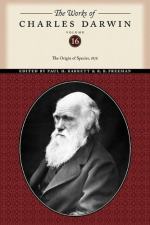We shall best understand the probable course of natural selection by taking the case of a country undergoing some physical change, for instance, of climate. The proportional numbers of its inhabitants would almost immediately undergo a change, and some species might become extinct. We may conclude, from what we have seen of the intimate and complex manner in which the inhabitants of each country are bound together, that any change in the numerical proportions of some of the inhabitants, independently of the change of climate itself, would most seriously affect many of the others. If the country were open on its borders, new forms would certainly immigrate, and this also would seriously disturb the relations of some of the former inhabitants. Let it be remembered how powerful the influence of a single introduced tree or mammal has been shown to be. But in the case of an island, or of a country partly surrounded by barriers, into which new and better adapted forms could not freely enter, we should then have places in the economy of nature which would assuredly be better filled up, if some of the original inhabitants were in some manner modified; for, had the area been open to immigration, these same places would have been seized on by intruders. In such case, every slight modification, which in the course of ages chanced to arise, and which in any way favoured the individuals of any of the species, by better adapting them to their altered conditions, would tend to be preserved; and natural selection would thus have free scope for the work of improvement.
We have reason to believe, as stated in the first chapter, that a change in the conditions of life, by specially acting on the reproductive system, causes or increases variability; and in the foregoing case the conditions of life are supposed to have undergone a change, and this would manifestly be favourable to natural selection, by giving a better chance of profitable variations occurring; and unless profitable variations do occur, natural selection can do nothing. Not that, as I believe, any extreme amount of variability is necessary; as man can certainly produce great results by adding up in any given direction mere individual differences, so could Nature, but far more easily, from having incomparably longer time at her disposal. Nor do I believe that any great physical change, as of climate, or any unusual degree of isolation to check immigration, is actually necessary to produce new and unoccupied places for natural selection to fill up by modifying and improving some of the varying inhabitants. For as all the inhabitants of each country are struggling together with nicely balanced forces, extremely slight modifications in the structure or habits of one inhabitant would often give it an advantage over others; and still further modifications of the same kind would often still further increase the advantage. No country can be named in which all the native inhabitants are now so perfectly adapted




